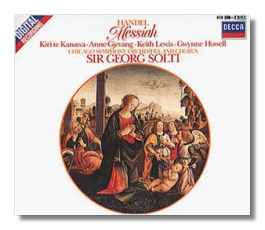
The Internet's Premier Classical Music Source
Related Links
- Handel Reviews
- Latest Reviews
- More Reviews
-
By Composer
-
Collections
DVD & Blu-ray
Books
Concert Reviews
Articles/Interviews
Software
Audio
Search Amazon
Recommended Links
Site News
 CD Review
CD Review
George Frideric Handel

Messiah
Kiri Te Kanawa, soprano
Ann Gjevang, alto
Keith Lewis, tenor
Gwynne Howell, bass
David Shrader, harpsichord
Adolph Herseth, trumpet
Chicago Symphony Chorus
Chicago Symphony Orchestra/Georg Solti
London 414396-2
Summary for the Busy Executive: If you ignore the chorus and the soloists, what's left?
I admit it. The hype swayed me. Apparently, Solti had achieved miracles and, amazingly, had never conducted the work before. I bought it with visions of something seven kinds of wonderful before me. After all, Solti had given very exciting accounts of Haydn's oratorios and Mahler's 8th. Even the vulgarity of his interpretations seemed to make him a natural for Handel. And how could you go wrong with the Chicago Symphony Orchestra and Chorus? The best I can say for it is that it's not completely incompetent, but it still fascinates like a bad road accident. I can easily believe Solti had never conducted this before.
The overture gets a capable, if not exceptional or particularly energetic, account. From the opening notes of the tenor, Keith Lewis, however, we find ourselves in deep doo. I might as well dispose of the quartet here and now. Lewis out-and-out bleats: I can't find another word for it. Gwynne Howell has a powerful voice, but it's not a very flexible one. His runs are gross smears. Ann Gjevang has a mean wobble and trouble keeping the beat besides. However, she does turn in a moving "He was despised." The most stylish of the group – no surprise – is Kiri Te Kanawa. But her tone is thin and reedy here, and she's a hair flat. But at least she can negotiate the music, with a nice "Rejoice greatly."
The chorus disappoints big-time. The "melismatic" choruses – "And the glory of the Lord," "For unto us a Child is born," "And He shall purify," "His yoke is easy" – oh, my. It's hard to describe, mainly because I can't believe what they've done. Each note in the fast runs is staccato, separate, and prefaced by an obvious "h." Thus, "And He shall purify" becomes "And He shall purifa-ha-ha-ha-ha-ha-ha-ha-ha-ha-ha-hy." Perhaps you could get away with this in a high-school choir 30 years ago before a crowd of adoring relatives, but not in a professional venue. It has a "tiptoe on eggshells" quality, where you proudly point out that you haven't broken any. Presumably Solti wanted it this way. They do better in the "monumental" choruses, although Solti sinks them with hokey little tricks of "interpretation," like sudden diminuendos, for no real reason.
The sound is superb, but who cares?
If this is the kind of music-making he has to look forward to, the Messiah may not return anytime soon.
Copyright © 1998, Steve Schwartz


















